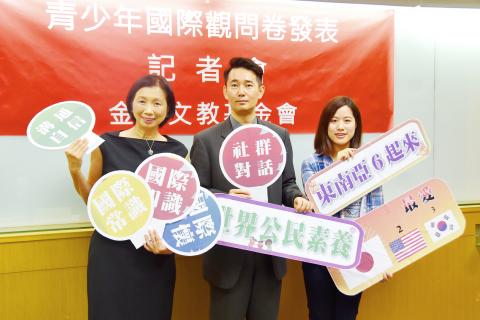About 50 percent of teenagers are uninterested in China’s “One Belt, One Road” initiative, the South China Sea dispute and other global issues that are closely related to Taiwan, a global perspective survey released on Thursday showed.
The poll, conducted by the King Car Cultural and Educational Foundation in September, canvassed 2,501 junior-high, senior-high and college students.
The survey found that 50.3 percent of teenagers are unfamiliar with the “One Belt, One Road” initiative, while 46.9 percent have limited knowledge about territorial disputes in the South China Sea, where Taiwan claims sovereignty over territories including the Spratly Islands (Nansha Islands, 南沙群島) and the Pratas Islands (Dongsha Islands, 東沙群島).

Photo: Wu Po-hsuan, Taipei Times
Due to the government’s New Southbound Policy, 66.1 percent of teenagers are willing to consider studying or working in Southeast Asia, the survey showed.
Regarding international relations, the survey found that 72.4 percent of teenagers believe that Japan is the nation friendliest toward Taiwan, followed by the US at 43.1 percent and South Korea at 24.8 percent.
Central and South America and the nation’s African allies ranked fifth and seventh respectively in terms of friendliness to Taiwan, the poll showed.
Besides Mandarin and English, 40.5 percent of teenagers believe that Taiwanese need to improve their Japanese-language skills the most, followed by European languages (20.9 percent), Korean (13.8 percent) and Southeast Asian languages (13.1 percent), the foundation said.
The poll found that 74.2 percent of teenagers believe that Taiwanese youth need to go abroad in order to obtain a global perspective.
When asked to rate their own level of global perspective and that of the general public, respondents gave both groups a score of less than 60 out of 100, the foundation said.
National Chengchi University College of International Affairs vice dean Huang Kwei-Bo (黃奎博) said the survey’s results showed that there is room for improvement in the global perspectives of teenagers.
They also suggested that international affairs topics might feel too distant for teenagers, leading them to be uninterested in global issues, foundation secretary-general Tseng Ching-yun (曾清芸) said.
Teenagers’ global perspective is too focused on a few nations, Tseng said, adding that this might be due to the influence of history, popular culture and the media.
She expressed concern that this might create a gap between teenagers’ global perspective and the real world.
Tseng made several suggestions on how teachers can cultivate a global perspective among students, including encouraging them to care about international news, to go on a working holiday, or to become an exchange student.

The Mainland Affairs Council (MAC) today condemned the Chinese Communist Party (CCP) after the Czech officials confirmed that Chinese agents had surveilled Vice President Hsiao Bi-khim (蕭美琴) during her visit to Prague in March last year. Czech Military Intelligence director Petr Bartovsky yesterday said that Chinese operatives had attempted to create the conditions to carry out a demonstrative incident involving Hsiao, going as far as to plan a collision with her car. Hsiao was vice president-elect at the time. The MAC said that it has requested an explanation and demanded a public apology from Beijing. The CCP has repeatedly ignored the desires

Many Chinese spouses required to submit proof of having renounced their Chinese household registration have either completed the process or provided affidavits ahead of the June 30 deadline, the Mainland Affairs Council (MAC) said on Thursday. Of the 12,146 people required to submit the proof, 5,534 had done so as of Wednesday, MAC deputy head and spokesperson Liang Wen-chieh (梁文傑) said. Another 2,572 people who met conditions for exemption or deferral from submitting proof of deregistration — such as those with serious illnesses or injuries — have submitted affidavits instead, he said. “As long as individuals are willing to cooperate with the legal

The Ma-anshan Nuclear Power Plant’s license has expired and it cannot simply be restarted, the Executive Yuan said today, ahead of national debates on the nuclear power referendum. The No. 2 reactor at the Ma-anshan Nuclear Power Plant in Pingtung County was disconnected from the nation’s power grid and completely shut down on May 17, the day its license expired. The government would prioritize people’s safety and conduct necessary evaluations and checks if there is a need to extend the service life of the reactor, Executive Yuan spokeswoman Michelle Lee (李慧芝) told a news conference. Lee said that the referendum would read: “Do

Taiwan's Vice President Hsiao Bi-khim (蕭美琴) said Saturday that she would not be intimidated by the Chinese Communist Party (CCP), following reports that Chinese agents planned to ram her car during a visit to the Czech Republic last year. "I had a great visit to Prague & thank the Czech authorities for their hospitality & ensuring my safety," Hsiao said on social media platform X. "The CCP's unlawful activities will NOT intimidate me from voicing Taiwan's interests in the international community," she wrote. Hsiao visited the Czech Republic on March 18 last year as vice president-elect and met with Czech Senate leadership, including